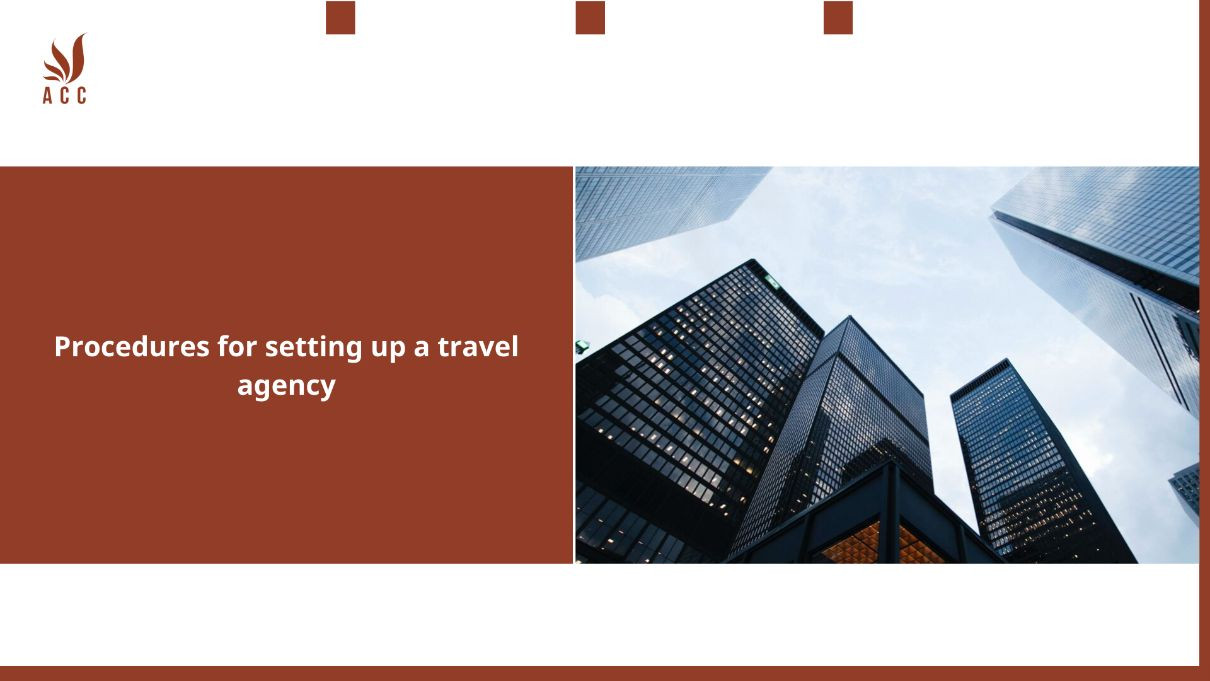Setting up a travel agency involves several procedures. Here is a general overview of the process:
1. Research and Planning:
Conduct thorough market research to identify potential opportunities and assess the demand for travel services in your target market. Identify your target customers, such as leisure travelers, corporate clients, or niche markets. Develop a comprehensive business plan that outlines your goals, services offered, marketing strategies, financial projections, and operational details.

2. Legal Considerations:
Determine the legal requirements for establishing a travel agency in your chosen location. Research the necessary permits, licenses, and certifications required to operate legally. Understand the regulations and requirements set by relevant authorities, such as tourism boards or travel industry associations.
3. Company Formation:
Choose a legal structure for your travel agency, such as a sole proprietorship, partnership, limited liability company (LLC), or corporation. Register your company with the appropriate government authorities and obtain the necessary business licenses and permits.
4. Financial Planning:
Determine your financial needs and secure appropriate funding sources for your travel agency. Develop a budget that covers startup costs, operational expenses, marketing, and contingencies. Consider factors such as office rent, staff salaries, technology, marketing materials, and insurance.
5. Supplier Relationships:
Establish relationships with travel suppliers, such as airlines, hotels, tour operators, car rental companies, and travel insurance providers. Negotiate contracts and agreements that define the terms, commissions, and responsibilities for each supplier. Ensure that your suppliers are reputable and offer competitive pricing and quality services.
6. Technology and Reservation Systems:
Invest in appropriate technology and reservation systems to manage bookings, itineraries, and customer information. Consider using Global Distribution Systems (GDS) or online travel agency platforms to access and book travel products. Train your staff on the effective use of these systems.
7. Q&A
Q: What are the primary steps involved in setting up a travel agency?
A: Establishing a travel agency typically includes these key steps:
Choose a unique business name and check its availability.
Register your travel agency as a legal entity (e.g., LLC, corporation).
Secure any necessary licenses or permits, such as a travel agency license.
Develop relationships with travel suppliers, including airlines, hotels, and tour operators.
Create a professional website and online booking system.
Q: Are there specific legal and regulatory considerations when establishing a travel agency?
A: Yes, there are legal and regulatory considerations, including:
Compliance with industry-specific regulations and licensing requirements.
Understanding consumer protection laws and refund policies.
Adherence to advertising and marketing regulations.
Proper handling of client funds and insurance requirements.
Q: How can a travel agency effectively market its services and attract clients?
A: To attract clients, travel agencies can:
Create a visually appealing website with detailed travel packages and information.
Utilize digital marketing strategies, including social media and email marketing.
Offer personalized service and expert travel advice.
Collaborate with local businesses, such as hotels and event planners.
Build a network of satisfied clients who can provide referrals and reviews.
Q: What are the key considerations for managing the operations and ensuring the success of a travel agency?
A: Managing a travel agency involves:
Efficiently handling reservations, bookings, and customer inquiries.
- Keeping up-to-date with travel trends, destination knowledge, and industry news.
- Providing exceptional customer service, especially in times of disruptions like flight cancellations or emergencies.
- Monitoring financials and cash flow, and managing commissions and payments to suppliers.
- Staying compliant with changing travel regulations and safety standards.
Nội dung bài viết:






Bình luận